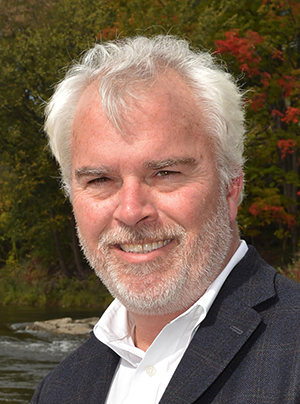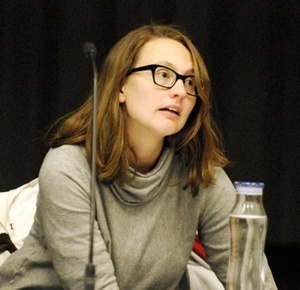By Elizabeth Harlow, Staff Writer
As the global conversation about climate change continues to intensify, and as federal-level environmental action in the United States has stagnated and regressed, many Americans are taking a closer look at what’s happening near home. Nonprofits like the Ecology Center and Recycle Ann Arbor have been at the forefront of high-impact local action for a long time, but city governments also play a major role in moving the needle, often thanks to the vigilance of a small number of unsung heroes.
 Seventeen years ago, the City created a new post: Environmental Coordinator. Detroit native and longtime Ann Arborite Matthew Naud originated and served in that role until retiring this past November. “He has contributed mightily to the health and happiness of our community, protecting our air, water, lands, and well-being,” says Ecology Center Director Mike Garfield.
Seventeen years ago, the City created a new post: Environmental Coordinator. Detroit native and longtime Ann Arborite Matthew Naud originated and served in that role until retiring this past November. “He has contributed mightily to the health and happiness of our community, protecting our air, water, lands, and well-being,” says Ecology Center Director Mike Garfield.
At this moment of transition, we asked both Matt and his successor Missy Stults to reflect on the City’s progress so far and on Ann Arbor’s areas and opportunities for growth moving forward.
Matt often conjured creative solutions out of a thin department budget, navigated state regulations that limited city action, and helped other issues at the same time as promoting environmental health. He has been a driving force in not only in responding to pressing issues in the city--monitoring 1, 4 dioxane under the city and mitigating groundwater contamination near the city’s old landfill, for example--but also, especially, in leading the City’s first comprehensive, proactive environmental strategy. He spearheaded both the City Sustainability Framework to guide major decisions and the Climate Action Plan, which commits Ann Arbor to reduce its climate emissions 90% by 2050.
“I was able, with the help of some great city colleagues, to help build sustainability into the way we were doing business,” Matt reflects. The Sustainability Framework built off of 30 different city plans--everything from the Solid Waste Plan to the Malletts Creek Creekshed Plan--to synthesize 225 separate goals into a more manageable, coordinated 16 goals that were adopted in the city’s master plan. This allowed Ann Arbor to move on from goal-setting by committees and to focus on setting targets and actions, and it baked environmental awareness into the process of city-planning-as-usual.
Matt takes particular pride in the connections he’s made and what they’ve made possible. “I’m proud of having a great working relationship with our local nonprofits,” he says, because that "has enabled me to learn a lot, to do things faster, more successfully, and with less money. Working with Ecology Center and others has allowed me to take advantage of all that scientific and strategic knowledge, tap into membership to build understanding and support, and do some things that have really made the city better."
The Ann Arbor Climate Partnership is one great example of the power of collaboration to make progress on an issue, and Matt cites Ann Arbor’s phosphorous ordinance as another. Ann Arbor’s municipal action to protect our water from unnecessary phosphorus runoff preceded and supported statewide protection for the Great Lakes. Matt worked with the Watershed Council and with University of Michigan researchers to collect and respond to data on local soil and water. It turned out that 85% of soil didn’t need added phosphorus to support healthy lawns. So Ann Arbor implemented a ban on unnecessary residential and commercial use of phosphorus in fertilizer and tested Huron River sites in the Ann Arbor area saw 17-30% drops in phosphorus. The Ann Arbor data set helped support a statewide ban that came into effect in 2010, four years after Matt turned Ann Arbor’s attention to the issue.
Moving forward, Matt envisions Ann Arbor as a place that will prioritize leadership in addressing climate change. He asks if not us, then who? "It’s incumbent upon us. We need to play a leadership role in this space. We have resources, we're one of the most educated cities on the planet, we know climate change is a huge problem, and yet somehow this continues not to be the priority that it should be.”
 As Ann Arbor’s new Sustainability and Innovation Coordinator, Missy Stults takes the same aspiration for leadership as her goal. “The rallying vision that I use is making Ann Arbor the most sustainable and equitable city in America. That's our guiding star.”
As Ann Arbor’s new Sustainability and Innovation Coordinator, Missy Stults takes the same aspiration for leadership as her goal. “The rallying vision that I use is making Ann Arbor the most sustainable and equitable city in America. That's our guiding star.”
Missy brings 15 years of focus and national level expertise on urban resilience to climate change to pursuing that guiding star. In an array of roles, she has worked on adaptation to climate change since 2004, and she holds dual PhDs from UM in urban & regional planning and natural resources & the environment.
"What I and my office are trying to do are trying to manage the unavoidable, and to do that with equity. Resilience is about mitigating, adapting, and being equitable. We're always thinking about all three, and about balancing all three."
She’s excited about an array of current initiatives, especially a cluster around energy efficiency, renewable energy, and affordable housing. For example, she’s working on creating a green rental efficiency standard and on a net zero energy affordable housing program that’s about to break ground in its first property, She wants buyers to have transparent access to a home’s energy cost, sellers to be incentivized to make energy efficiency upgrades, and renters to be able to live in efficient and affordable. For owners, renters, and the city, savings on energy costs can go toward spending and investing on other things. She’s also looking at shifting city operations toward renewable energy, using existing programs like SolarYpsi as models.
Missy hopes to forward Matt’s legacy of engaging multiple partners, including organizations and individual citizens. "I have deep deep respect for the work the Ecology Center is doing, for example,” she says. “They're a tremendous advocate and important strategic partner in ideation and mobilization." She’s also moving initiatives forward that focus closely on engaging people at the neighborhood level, including the new Sustaining Ann Arbor Together Grant Program, which allows anyone to apply for resources to help create the city’s first Resilience Hubs--sites for equipped for emergency preparedness and resourced to support everyday neighborhood needs such as after-school care or local food production.
Both Matt and Missy stress how important it is for people who care about the environment not to keep their concerns to themselves. “There's a strong climate voice in the community that is not being heard,” says Matt. “The most important thing is to start talking about climate change--with your family members, with your coworkers. Make sure you let your elected officials know where you stand.”
Missy especially encourages speaking out to your representatives. “Most elected officials don’t hear from very many constituents, and it matters that they do,” she says. “Letting your representative at any scale know that these are goals you care about and you are watching” can make a substantial difference. She also invites reaching out to her office. “We welcome your ideas and energy!”
Both see promise for the future. Matt says he’s “hopeful with our new governor that there's a better opportunity for cities to work with the state.” For her part, Missy feels undeterred by the obstacles ahead, substantial as they are. In past nonprofit work, she engaged with over 600 government members across the country and saw potential across the board, regardless of political structures and orientations. As a result, she says "no’s don't feel very intimidating to me. They feel like the cusp of a maybe."
"If I accept the status quo,” Missy says, “I accept our projected environmental future. And I cannot accept that future." We can’t avoid all the effects of preexisting environmental damage, but we can minimize it, and fixing our status quo can much make life better in other ways. “There are such significant co-benefits of solving climate change that also solves other problems," Matt reminds. “I’m excited to see how Missy is able to take Ann Arbor to the next step.”


